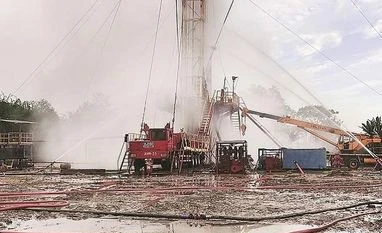The measures were recommended by a three-member committee of the ministry of petroleum and natural gas (MoPNG). The committee comprised SCL Das, director general of the Directorate General of Hydrocarbons, BC Bora, former chairman of Oil and Natural Gas Corporation (ONGC) and TK Sengupta, former director at ONGC.
According to officials in the know, the safety measures recommended include the restructuring of workover operations and the introduction of IT-enabled systems in drilling, workover, and production operations. Steps have also been taken to map the competence of all key personnel, give safety and well-control training to employees at all levels, and develop a strong crisis management team.
The committee had also suggested the review and establishment of additional standard operating procedures where required, the sources added.
In response to a query from Business Standard, Oil India Limited (OIL) said that it has already begun to implement the recommendations.
OIL had suspended operations at well No 5 in its Baghjan oilfield after the blowout on May 27, 2020. Then on June 9, the well caught fire. After multiple attempts, all the jobs pertaining to the capping, killing and the final abandonment of the well were completed on December 3, 2020. According to OIL, the cost of extinguishing the fire, including relief and rehabilitation, amounted to about ~450 crore.
The fire in Baghjan caused three casualties and multiple injuries. An estimated 2,756 families in Doomdooma and Tinsukia were affected and were subsequently compensated. The blowout also impacted upstream oil and gas operations across Assam.
According to the Monthly Production Report by the MoPNG, bandhs and blockades by the local people in the wake of the Baghjan blowout have made a dent in the domestic oil and gas output. These protests are still being cited as one of the reasons for the lower natural gas production by OIL in the MoPNG’s June 2021 Monthly Production Report, which was released last week.
“The Baghjan gas well blowout temporarily impacted OIL’s daily production. Subsequent to the successful capping of the blowout well, field development activities for the production of oil and gas from Baghjan is being continued and wells are being drilled in the vicinity of Baghjan-5 well. There is no indicative impact of the blowout on the reservoir,” OIL said.
According to earlier estimates by OIL, the Baghjan blowout resulted in the loss of 46,786 metric tonnes of crude oil and 124.15 million standard cubic meters ((mscm) of natural gas between May 27 and November 5, 2020. However, the company pointed out that after the successful diversion of the well on September 13, 2020, a cumulative production of 6960 kilo litres (KL) of condensate, along with 49.01 mscm of natural gas, was achieved till November 5, 2020.
During 2020-21, India’s total domestic oil production stood at 30.49 million tonnes, while natural gas output stood at 28.67 billion standard cubic metres. India’s entire oil and gas production is consumed in the domestic market.
Though rare, blowouts have taken place in the past in the upstream petroleum industry.
Responding to a query in the Lok Sabha, the minister of state for petroleum and natural gas, Rameshwar Teli, said two blowout incidents have occurred in the last three years.
The first was on February 2, 2020 during a well activation by PFH Oil and Gas, a firm which has been awarded a contract for oil and natural gas exploration and production under the Discovered Small Field Policy in Andhra Pradesh. This blowout was controlled with the help of ONGC’s crisis management team (CMT) on February 4, 2020.
To read the full story, Subscribe Now at just Rs 249 a month
Already a subscriber? Log in
Subscribe To BS Premium
₹249
Renews automatically
₹1699₹1999
Opt for auto renewal and save Rs. 300 Renews automatically
₹1999
What you get on BS Premium?
-
Unlock 30+ premium stories daily hand-picked by our editors, across devices on browser and app.
-
Pick your 5 favourite companies, get a daily email with all news updates on them.
Full access to our intuitive epaper - clip, save, share articles from any device; newspaper archives from 2006.
Preferential invites to Business Standard events.
Curated newsletters on markets, personal finance, policy & politics, start-ups, technology, and more.
Need More Information - write to us at assist@bsmail.in
)